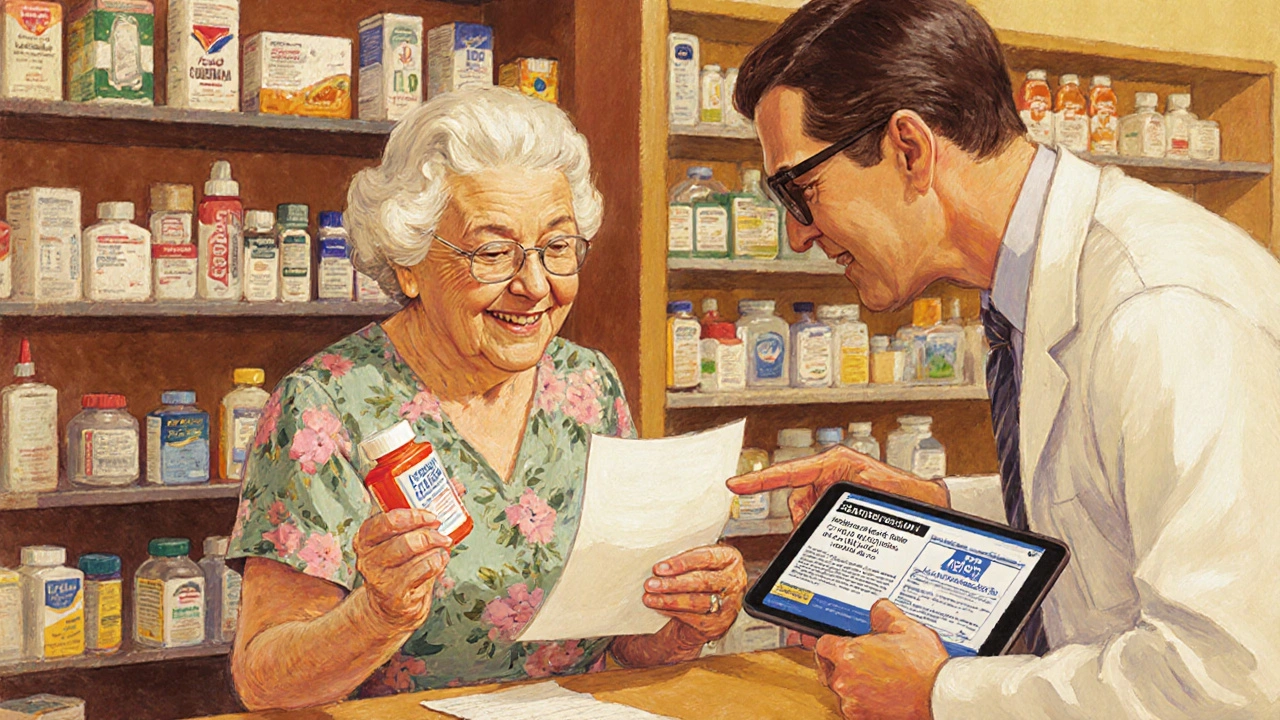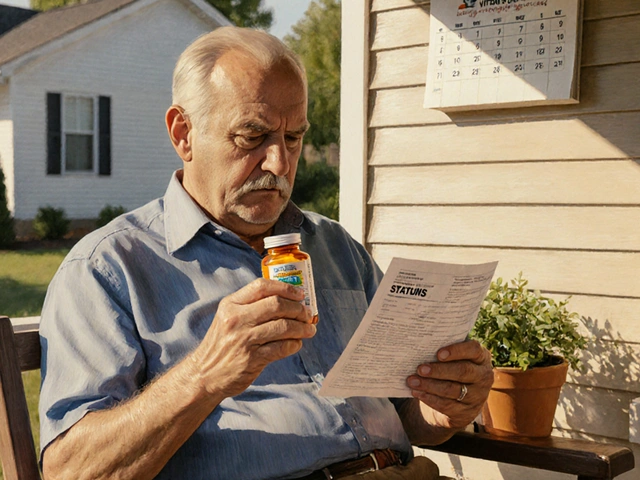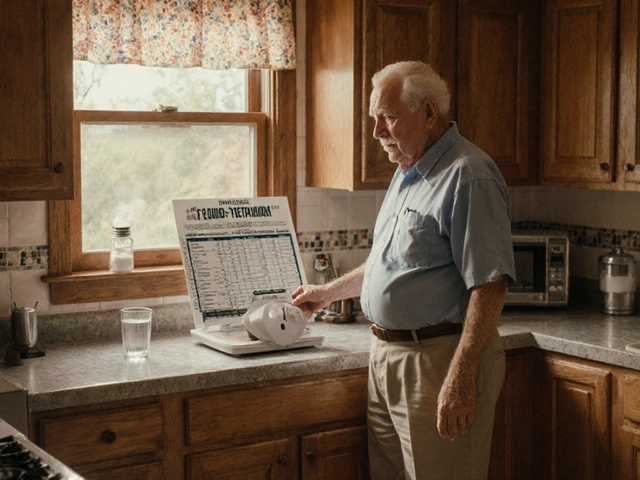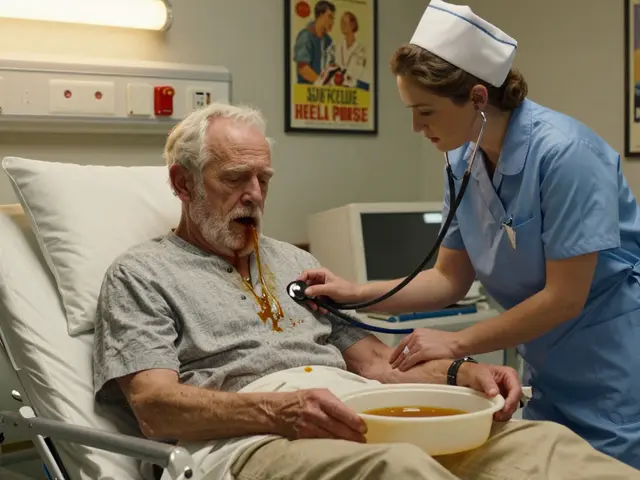Every year, millions of people in the UK and beyond take over-the-counter (OTC) medicines without thinking twice. A headache? Grab some paracetamol. Stuffy nose? Reach for the antihistamine. Heartburn? A quick antacid. But here’s the thing: OTC medication interactions with your prescription drugs can turn a simple remedy into a serious health risk - and most people have no idea.
You might not think of ibuprofen or cold medicine as dangerous. But when you’re on blood thinners, antidepressants, or high blood pressure pills, even common OTC drugs can cause harm. The FDA says these interactions can make your prescription less effective, cause unexpected side effects, or even amplify a drug’s action to dangerous levels. And the worst part? Most patients never tell their doctor what OTC meds they’re taking.
Why OTC Medications Are More Dangerous Than You Think
OTC drugs aren’t harmless. They’re active chemicals - just like your prescription meds. The difference? You don’t need a script to get them. That’s why people assume they’re safe to mix. But that’s a myth.
Take acetaminophen (paracetamol). It’s in more than 200 products: painkillers, cold remedies, flu tablets, sleep aids. If you take one for a headache, another for a cold, and a third for sleep, you could easily hit 7,000mg in a day. The safe limit? 4,000mg. Exceed that, and you risk acute liver failure - no warning signs, no pain until it’s too late.
Or consider NSAIDs like ibuprofen and naproxen. If you’re on warfarin for a blood clot, combining it with an NSAID can double or triple your bleeding risk. If you’re on a daily low-dose aspirin to protect your heart, ibuprofen can block aspirin’s antiplatelet effect. That means your heart attack protection disappears - and you won’t know until it’s too late.
Top 5 Dangerous OTC-Prescription Combinations
Some combinations are so risky, they’re routinely flagged by pharmacists. Here are the five you need to know:
- SSRIs + NSAIDs - Antidepressants like sertraline or fluoxetine combined with ibuprofen can cause serious gastrointestinal bleeding. Studies show this mix increases bleeding risk by 3 to 10 times.
- Levothyroxine + Omeprazole - If you take thyroid medication, don’t use proton pump inhibitors like omeprazole (Prilosec) for heartburn. The acid blocker cuts absorption of levothyroxine by up to 50%, leaving you hypothyroid - tired, gaining weight, depressed - without realizing why.
- Antihistamines + Sedatives - First-gen antihistamines like diphenhydramine (Benadryl) are in many sleep aids and cold meds. When mixed with prescription anxiety meds or painkillers like tramadol, they can cause extreme drowsiness, confusion, and falls - especially in older adults.
- Antacids + Digoxin - If you have heart failure and take digoxin, aluminum or magnesium antacids can reduce its absorption by 25%. That means your heart medication stops working properly. You might feel fine - until your heart rhythm goes wrong.
- NSAIDs + Blood Pressure Meds - Ibuprofen, naproxen, and even aspirin can make your blood pressure meds (like lisinopril or amlodipine) less effective. Your pressure might jump 5-15 mmHg. That’s enough to raise your stroke risk.
What You Might Not Realize: Food, Supplements, and OTC Drugs
It’s not just pills. What you eat or drink can clash with your meds - and OTC supplements make it worse.
St. John’s Wort, a popular herbal remedy for low mood, can make birth control pills fail, reduce the effect of antidepressants, and interfere with heart meds. It’s sold as “natural,” but it’s a powerful drug interaction waiting to happen.
Even grapefruit juice is dangerous. It can skyrocket levels of statins, blood pressure drugs, and some anti-anxiety meds. One glass can cause a toxic buildup - and the effect lasts over 24 hours.
And don’t forget vitamins. Iron, calcium, and zinc in multivitamins can bind to antibiotics like tetracycline or thyroid meds, stopping them from being absorbed. Take them at least 4 hours apart - or better yet, ask your pharmacist.

Who’s at Highest Risk?
Not everyone is equally vulnerable. These groups need extra caution:
- People over 65 - On average, they take 5+ medications daily. More drugs = more chances for interaction.
- Those with kidney or liver disease - Your body can’t clear drugs the same way. OTC meds build up faster.
- People with heart disease, diabetes, or asthma - Even small changes in drug levels can trigger complications.
- Anyone taking 3+ prescription drugs - The risk of interaction jumps sharply after three meds.
And here’s the quiet crisis: elderly patients often take OTC meds for sleep, constipation, or occasional pain - and never mention them to their doctor. Why? They think it’s “just a pill.” But those “just a pill” moments are why 6.7% of hospital admissions are caused by drug interactions - many from OTC sources.
What You Should Do Right Now
You don’t need to be a pharmacist to protect yourself. Here’s your simple action plan:
- Make a full list - Write down every prescription, OTC medicine, supplement, and herbal product you take. Include the reason you take it and the dose.
- Check labels - Always read the “Active Ingredients” section. If two products list acetaminophen or ibuprofen, don’t take them together.
- Ask your pharmacist - Before buying any OTC drug, ask: “Is this safe with my prescriptions?” Pharmacists are trained for this. They see these interactions every day.
- Use a drug checker - Tools like WebMD’s Drug Interaction Checker (updated 2023) let you enter all your meds and get instant warnings. It covers 24,000+ medications and 850+ foods.
- Bring your list to every appointment - Even if you’re seeing a new doctor. Don’t assume they’ll know what you’re taking.
And if you’re ever unsure? Don’t guess. Wait. Call your pharmacist. Or delay taking the OTC drug until you’ve checked.

Why This Isn’t Just Your Problem - It’s a System Failure
OTC labels don’t warn you clearly. You won’t see big red text saying “May cause fatal bleeding if you’re on warfarin.” Instead, you get tiny print buried under “For temporary relief.”
The FDA started pushing for clearer labeling in 2022, but progress is slow. Electronic health records still don’t track OTC use - because patients don’t report it. So your doctor might not know you’re taking a daily antihistamine, even if you’re on 10 other pills.
This isn’t about being careless. It’s about a system that treats OTC drugs like harmless snacks - when they’re really powerful chemicals.
But you can change that. By asking questions, by checking labels, by speaking up - you protect yourself. And you help others learn too.
Final Thought: Don’t Assume It’s Safe
There’s no such thing as a “safe” OTC drug if you’re on prescriptions. Every pill has a story - how it’s absorbed, how it’s broken down, who it affects. What works for your neighbour might be dangerous for you.
So next time you reach for that cold medicine, pause. Ask yourself: “What else am I taking?”
That one question could save your life.
Can I take paracetamol with my blood pressure medication?
Yes, paracetamol (acetaminophen) is generally safe with most blood pressure medications like lisinopril, amlodipine, or losartan. Unlike NSAIDs (ibuprofen, naproxen), it doesn’t interfere with blood pressure control or cause fluid retention. But don’t exceed 4,000mg per day - and avoid combining it with cold or flu remedies that also contain paracetamol. Always check the active ingredients.
Is it safe to take ibuprofen with antidepressants?
Not without caution. Combining ibuprofen with SSRIs like sertraline or fluoxetine can significantly increase your risk of gastrointestinal bleeding - by up to 10 times in some cases. This is because both drugs affect blood clotting. If you need pain relief, talk to your doctor. Paracetamol is often a safer alternative. Never start or stop either drug without professional advice.
Can OTC sleep aids interact with prescription meds?
Yes - and the risk is highest for older adults or those taking anxiety meds, opioids, or sedatives. Many OTC sleep aids contain diphenhydramine, which causes drowsiness. When combined with prescription drugs like diazepam, tramadol, or even some antidepressants, it can lead to extreme drowsiness, confusion, falls, or even breathing problems. Always check the label and ask your pharmacist before using sleep aids with any other medication.
Do antacids interfere with prescription drugs?
Yes. Antacids with aluminum, magnesium, or calcium can reduce absorption of several key drugs. For example, they can lower digoxin (for heart failure) by up to 25%, or reduce the effectiveness of thyroid meds like levothyroxine. To avoid this, take antacids at least 2-4 hours apart from your prescription. If you’re unsure, ask your pharmacist for timing advice.
Should I stop taking OTC meds before a doctor’s appointment?
No. Never stop taking any medication - OTC or prescription - without talking to your doctor. Instead, bring a full list of everything you take, including doses and how often. Your doctor needs to know what you’re using to spot potential interactions. Stopping suddenly could cause withdrawal, rebound symptoms, or worsen your condition. Honesty is safer than silence.






Comments
Esperanza Decor
12/Nov/2025I used to think OTC meds were harmless until my mom ended up in the ER after mixing ibuprofen with her blood thinner. No warning labels screamed at her. Just tiny text buried under 'relieves pain and fever.' Now I check every label like it's a bomb defusal manual. If you're on more than three prescriptions, assume every OTC pill could be a landmine.
Pharmacists aren't just people who hand out pills-they're your last line of defense. Ask them. Even if you feel dumb. Better to look silly than end up on a ventilator.
Deepa Lakshminarasimhan
12/Nov/2025They don’t want you to know this, but Big Pharma makes billions off OTC drugs because they know you won’t read the fine print. The FDA? They’re slow. The labels? Designed to confuse. You think paracetamol is safe? It’s in 200 products so you accidentally overdose and they call it 'accidental poisoning'-not a design flaw.
They profit from your ignorance. And the worst part? They sell you 'natural' supplements that interact worse than synthetics. St. John’s Wort isn’t herbal wisdom-it’s a chemical grenade with a smiley face on the bottle.
Erica Cruz
12/Nov/2025Look, this article is technically correct but so basic it’s almost insulting. Anyone who doesn’t know that NSAIDs mess with anticoagulants shouldn’t be allowed to leave their house unsupervised. And don’t get me started on people taking ‘natural’ supplements like they’re vitamins instead of potent enzyme inhibitors.
Also, WebMD’s drug checker? It’s a joke. Half the interactions it flags are false positives, and it misses the real ones-like how grapefruit juice interacts with calcium channel blockers in ways that aren’t even listed because the FDA hasn’t updated their database since 2017.
Real solution? Stop taking everything. Just sit still. Let your body heal. Or better yet-pay for a real doctor who actually knows pharmacology instead of relying on a blog post with bullet points.
Johnson Abraham
12/Nov/2025bro i just take tylenol for everything and never had a prob lol
my uncle took ibuprofen with his heart med and he be fine. maybe ur just weak or sumthin. why u gotta overthink a pill? its not rocket science. just dont take 10 at once and ur good. also grapefruit juice is just a myth made up by doctors to sell more meds.
:P
Shante Ajadeen
12/Nov/2025This is such a needed post. I’ve been telling my dad for years not to take that antacid with his thyroid med-he just says ‘it’s just Tums.’ I printed out the list of dangerous combos and taped it to his medicine cabinet. He still forgets, but now he asks me before he takes anything.
Also, I started keeping a physical list in my wallet. I show it to every provider, even the dentist. No one ever asks, but I make sure they see it. It’s not paranoia-it’s self-preservation.
You don’t need to be a genius to stay safe. Just be consistent. And don’t be embarrassed to ask.
dace yates
12/Nov/2025Does anyone know if melatonin interacts with SSRIs? I’ve been taking it for sleep and just started sertraline. I feel foggy in the mornings and I’m not sure if it’s the med or the supplement. No one ever talks about sleep aids in these lists.
Danae Miley
12/Nov/2025Correction: The FDA didn’t 'start pushing' for clearer labeling in 2022-they mandated it. And the industry is actively resisting. The reason labels remain misleading is corporate lobbying, not bureaucratic inertia. This isn’t negligence. It’s intentional obfuscation.
Also, WebMD’s checker is not updated in 2023-it’s outdated. Use Micromedex or Lexicomp. They’re subscription-based because they’re accurate. Free tools are marketing tools, not medical ones.
Stop trusting free internet advice when your life is on the line.
Charles Lewis
12/Nov/2025Let me offer a broader perspective: the systemic failure isn’t just about labeling or patient ignorance-it’s about the fragmentation of healthcare delivery. Your primary care physician doesn’t know what your cardiologist prescribed, your pharmacist doesn’t have access to your EHR, and your OTC purchases are tracked nowhere. We’ve built a system where responsibility is diffused across 17 different touchpoints, none of which communicate.
Until we integrate OTC medication tracking into electronic health records-and require pharmacies to flag interactions at point of sale-we’re just rearranging deck chairs on the Titanic. The solution isn’t more education for patients. It’s better infrastructure for providers.
And yes, I’ve worked in pharmacy for 27 years. I’ve seen this exact scenario play out 300 times. It’s not the patient’s fault. It’s the system’s.
Renee Ruth
12/Nov/2025They’re hiding something. Why do all the warning labels say ‘consult your doctor’ but never say ‘this could kill you’? Why do they put acetaminophen in EVERYTHING? Because they want you to overdose. It’s not an accident-it’s a business model. Liver failure means more hospital bills, more prescriptions, more profits.
And don’t tell me it’s ‘just a pill.’ If it was just a pill, why is it in 200 products? Why is there no clear daily limit on the front? Why do they use tiny font and bury it under ‘for temporary relief’? Because they don’t want you to see it.
I’m not paranoid. I’m paying attention.
Samantha Wade
12/Nov/2025This is the kind of post that saves lives. I’ve been a nurse for 18 years, and I’ve seen too many elderly patients admitted for GI bleeds, liver failure, and arrhythmias-all preventable. And every single time, the family says, ‘But she only took Advil for her arthritis.’
I give every patient a laminated card that lists the top 5 dangerous combos. I hand it to them. I make them read it out loud. I ask them to show it to their pharmacist. And I tell them: ‘Your health isn’t a suggestion. It’s your responsibility.’
If you’re reading this, take five minutes right now. Write down everything you’re taking. Even the gummy vitamins. Even the herbal tea. Then call your pharmacist. Don’t wait. Don’t assume. Act.
You’re not being dramatic. You’re being smart.